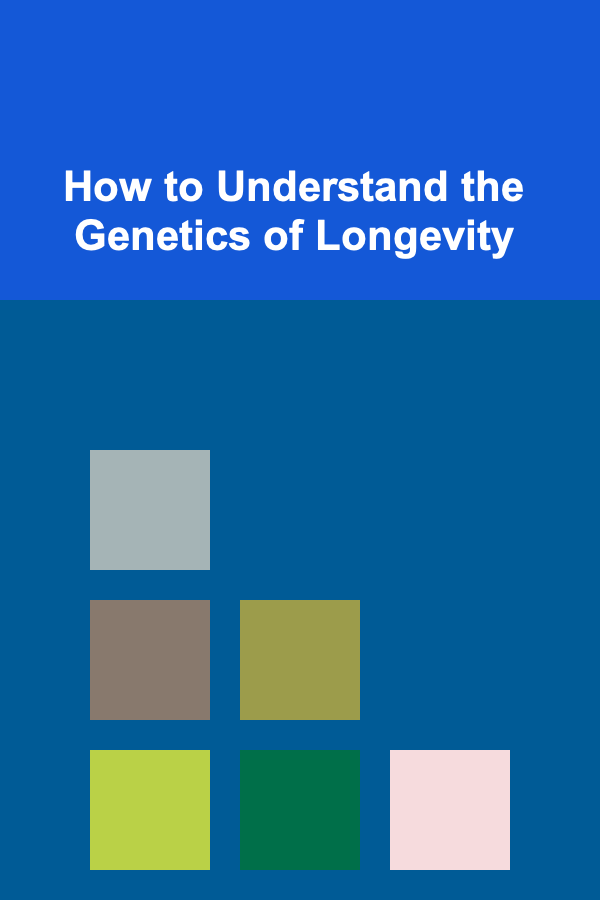
How to Understand the Genetics of Longevity
ebook include PDF & Audio bundle (Micro Guide)
$12.99$9.99
Limited Time Offer! Order within the next:

Longevity has always been a subject of fascination and a pursuit for humans throughout history. From ancient philosophers to modern scientists, the question of how and why some individuals live longer than others has intrigued many. With advancements in genetics, we are beginning to unravel the intricate mechanisms behind aging and the genetic factors that influence lifespan. This article will explore the genetics of longevity, discussing key genes, genetic variations, and how these contribute to a longer and healthier life.
The Link Between Genetics and Longevity
Genetics plays a crucial role in determining the lifespan of an individual, but it is not the sole factor. While environmental factors such as diet, exercise, and lifestyle are important, genetics provides the foundational blueprint for our health and aging. Research has shown that about 25% of lifespan variability can be attributed to genetic factors, with the remaining 75% influenced by environmental factors and lifestyle choices.
Key Genetic Factors in Longevity
Several genes have been identified that seem to play a significant role in the aging process and influence longevity. These genes are involved in various biological processes such as DNA repair, metabolism, and immune function. Some of the most well-known genes associated with longevity include:
1. FOXO3 Gene
The FOXO3 gene is one of the most studied genes in longevity research. It encodes a transcription factor that regulates the expression of genes involved in stress resistance, metabolism, and cell survival. Variations of the FOXO3 gene have been linked to an increased lifespan. Studies have found that certain variants of this gene are more common in centenarians (people who live to be 100 or older). The FOXO3 gene plays a critical role in reducing oxidative stress and maintaining cellular health, which are crucial for aging.
2. SIRT1 Gene
The SIRT1 gene encodes a protein that is part of the sirtuin family of proteins, which regulate cellular processes related to aging and stress resistance. SIRT1 has been shown to extend lifespan in various organisms, including yeast, worms, and mice. It influences cellular repair mechanisms and regulates metabolism by activating a series of protective pathways. The SIRT1 gene has been widely studied in the context of caloric restriction, a well-known method to extend lifespan, as it mimics the effects of reduced food intake, thereby activating longevity-promoting pathways.
3. APOE Gene
The APOE (Apolipoprotein E) gene is well-known for its role in lipid metabolism and cardiovascular health. It has several variants, including APOE ε2, ε3, and ε4. The APOE ε4 allele has been associated with an increased risk of Alzheimer's disease and cardiovascular conditions, while the APOE ε2 allele is thought to offer protection against these diseases. Studies have shown that individuals with the APOE ε2 allele tend to live longer and have a lower risk of age-related diseases. The gene's impact on longevity is primarily related to its effects on cholesterol and brain health.
4. Telomerase Genes (TERT and TERC)
Telomeres are the protective caps at the ends of chromosomes that shorten with each cell division. Once telomeres become too short, cells can no longer divide, which leads to aging and cell death. The telomerase enzyme, encoded by the TERT (Telomerase Reverse Transcriptase) and TERC (Telomerase RNA Component) genes, plays a critical role in maintaining telomere length by adding DNA sequences to the ends of chromosomes. Individuals with longer telomeres or enhanced telomerase activity tend to have longer lifespans. Some studies have shown that mutations in telomerase genes can be linked to aging-related diseases such as dyskeratosis congenita, which is associated with premature aging.
5. Mitochondrial Genes
Mitochondria are the powerhouses of the cell, responsible for energy production. As we age, mitochondrial function tends to decline, leading to cellular damage and accelerated aging. Mitochondrial DNA (mtDNA) is inherited maternally and plays a critical role in longevity. Some mitochondrial gene variants have been linked to extended lifespan by improving mitochondrial function and reducing oxidative damage. Research into the genetics of mitochondria has shown that maintaining mitochondrial health is essential for slowing down the aging process.
How Do Genes Influence Longevity?
The mechanisms by which genes influence longevity are complex and involve multiple biological processes. Here are some of the key ways in which genes contribute to a longer lifespan:
1. DNA Repair and Maintenance
One of the most important factors in aging is the accumulation of DNA damage over time. Our cells are constantly exposed to environmental factors such as UV radiation, pollutants, and internal metabolic processes that can cause damage to our DNA. The body's ability to repair this damage is crucial for maintaining cellular health and preventing aging-related diseases such as cancer.
Certain genes are responsible for repairing DNA damage. For example, the BRCA1 and BRCA2 genes, which are best known for their role in breast cancer susceptibility, also contribute to DNA repair mechanisms. Efficient DNA repair is critical for longevity, as it reduces the risk of mutations that can lead to diseases and aging-related declines in health.
2. Oxidative Stress and Inflammation
Oxidative stress refers to the imbalance between the production of free radicals and the body's ability to neutralize them with antioxidants. Free radicals are highly reactive molecules that can damage cells, proteins, and DNA, leading to aging and degenerative diseases. Chronic inflammation, often associated with aging, can exacerbate oxidative stress and further damage tissues.
Genes that regulate oxidative stress and inflammation play a key role in longevity. For instance, the Nrf2 gene regulates the body's antioxidant defense systems, while the IL-6 gene is involved in inflammatory responses. Lower levels of chronic inflammation and reduced oxidative damage are associated with longer lifespans.
3. Metabolism and Insulin Sensitivity
Metabolic processes, such as how the body processes food and converts it into energy, are closely linked to aging. Efficient metabolism is crucial for maintaining healthy body weight, preventing age-related diseases like diabetes, and ensuring the proper functioning of cells.
Certain genes that regulate insulin sensitivity and metabolic processes have been linked to longevity. The Insulin Receptor Substrate (IRS) genes, for example, play a role in insulin signaling, which influences aging and longevity. Caloric restriction, a well-established method to extend lifespan in various organisms, is thought to work by activating metabolic pathways that enhance the body's ability to repair itself and resist damage.
4. Cellular Senescence and Autophagy
Cellular senescence refers to the process by which cells lose their ability to divide and function properly. Senescent cells accumulate over time and are thought to contribute to aging and the development of age-related diseases. Autophagy, on the other hand, is the process by which cells remove damaged components and recycle them to maintain cellular health.
Genes involved in regulating cellular senescence and autophagy are crucial for longevity. The p53 gene, which is known for its role in suppressing tumors, also regulates cellular senescence. The ATG (autophagy-related) genes are involved in autophagy and help maintain cellular health by removing damaged organelles and proteins, reducing the risk of aging-related cellular dysfunction.
The Role of Environmental and Lifestyle Factors
While genetics certainly influences longevity, it is essential to recognize the interaction between genes and environment. Environmental factors such as diet, physical activity, stress levels, and exposure to toxins can all have a profound impact on aging. In fact, a healthy lifestyle can offset some of the negative effects of genetic predispositions to age-related diseases.
Diet and Nutrition
A healthy diet rich in antioxidants, vitamins, and essential nutrients plays a significant role in promoting longevity. Certain foods, such as those high in omega-3 fatty acids, polyphenols, and vitamins C and E, have been shown to reduce oxidative stress and inflammation, which are key drivers of aging.
Physical Activity
Regular physical activity has been shown to improve insulin sensitivity, reduce inflammation, and promote cardiovascular health. Studies of centenarians often highlight their active lifestyles, including regular walking, gardening, and other forms of exercise that contribute to healthy aging.
Stress Management
Chronic stress accelerates the aging process by promoting inflammation and oxidative damage. Genes involved in stress response, such as those related to the adrenal glands and cortisol production, influence how individuals cope with stress. Managing stress through meditation, relaxation techniques, and social support can improve longevity.
Conclusion
Understanding the genetics of longevity is a complex and rapidly evolving field. While much has been learned about the genes and biological processes that influence lifespan, the science is still in its early stages. Through ongoing research, we are gaining deeper insights into how specific genes affect aging, how they interact with environmental factors, and how we might be able to manipulate these pathways to promote healthier, longer lives.
Though genetics plays a significant role in determining lifespan, it is important to remember that lifestyle choices and environmental factors are also key. The future of longevity research holds exciting possibilities, and with advances in genetic engineering, we may one day be able to unlock even more secrets about how to extend human lifespan.

How to Achieve an Industrial Look with the Right Lighting Fixtures
Read More
How to Incorporate Vintage Lighting into Modern Interiors
Read More
How to Organize a Family Book Club
Read More
How to Make Your Own Layer Cakes (Advanced)
Read More
Mastering Permaculture Principles in Your Garden: A Comprehensive Guide
Read More
**10 Tips for Running with a Dog**
Read MoreOther Products

How to Achieve an Industrial Look with the Right Lighting Fixtures
Read More
How to Incorporate Vintage Lighting into Modern Interiors
Read More
How to Organize a Family Book Club
Read More
How to Make Your Own Layer Cakes (Advanced)
Read More
Mastering Permaculture Principles in Your Garden: A Comprehensive Guide
Read More